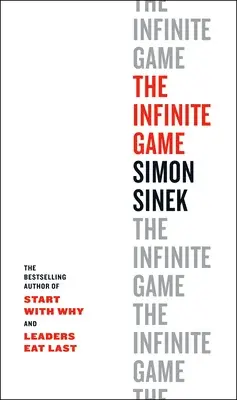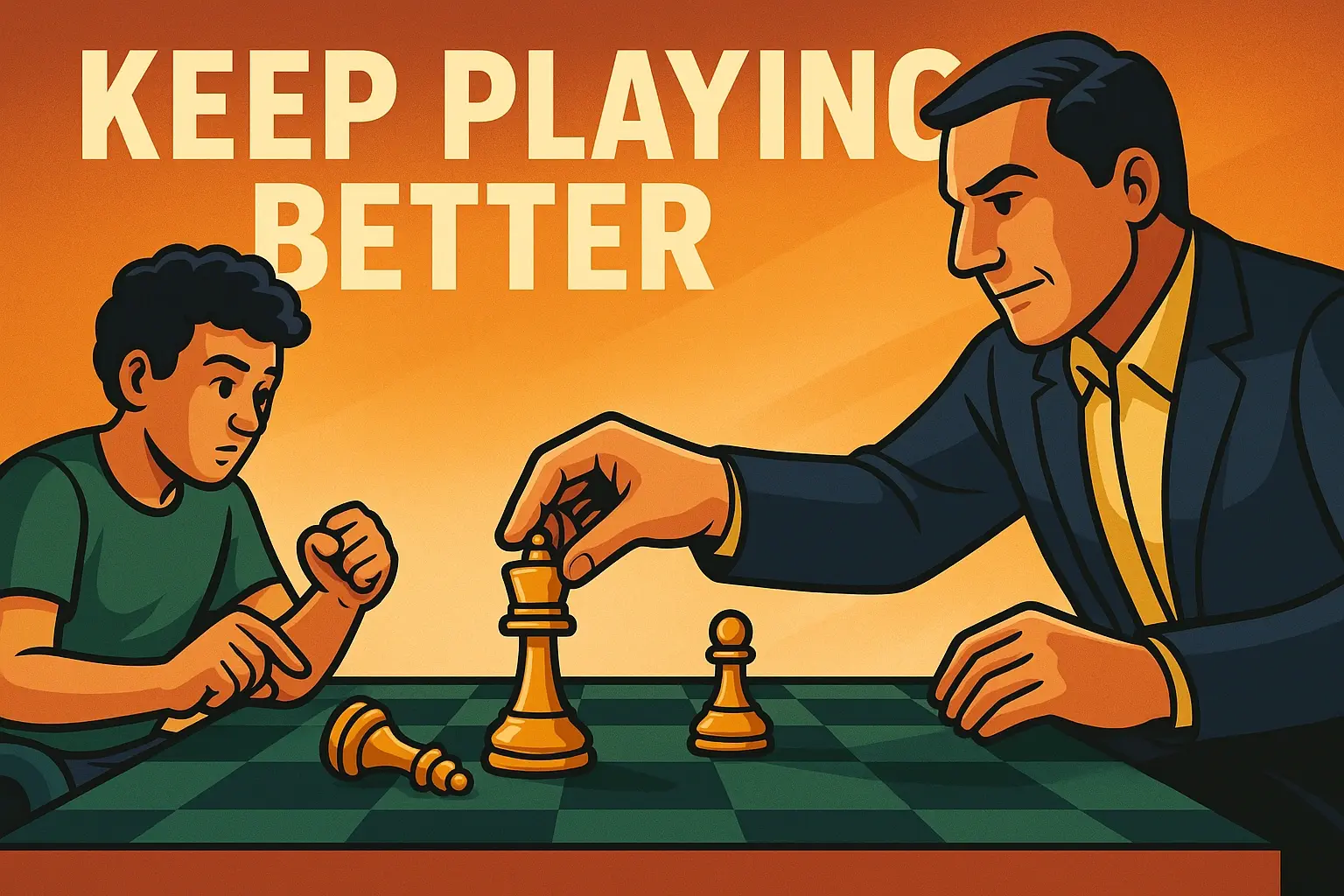
The Infinite Game
By Simon Sinek
Published October 4, 2025
Simon Sinek argues that many leaders accidentally play a short-term, win-lose “finite” game in an arena—business—where the rules and players constantly change. The result is burnout, ethical drift, and brittle companies. The Infinite Game reframes leadership around staying power: pursuing a Just Cause, building Trusting Teams, learning from Worthy Rivals, practicing Existential Flexibility, and having the Courage to Lead. The payoff is resilience, reputation, and compounding value over time—because the goal isn’t to win, but to keep playing better.
Key Lesson
In an infinite game, the goal isn’t to win—it’s to keep playing better.
Keep Playing Better
Book Snapshot
ISBN
9780241295595
ASIN
073521350X
Topics & Search Phrases

Full Summary
The Infinite Game is a mindset manual for leaders who are tired of chasing quarterly wins at the expense of long-term health. Simon Sinek borrows from game theory to distinguish between two kinds of games. Finite games, like chess or a 90-minute football match, have fixed rules, agreed-upon players, and a clear endpoint. By contrast, infinite games—like culture, marriage, and business—have changing players, evolving rules, and no finish line. Declaring victory in an infinite game makes about as much sense as “winning” friendship; you can be ahead for a while, but the game continues tomorrow. Problems arise when leaders apply a finite mindset to an infinite game. Short-term optimization looks like progress, but it mortgages the future, slowly eroding trust, resilience, and the capacity to adapt.
Sinek’s core claim is deceptively simple: in an infinite game, the objective is to keep playing. The best leaders therefore design for durability. They protect relationships, invest in culture, and resist the temptation to trade integrity for immediate gains. The book organizes this mindset into five practical principles that act like guardrails when pressure mounts.
-
Just Cause. Infinite-minded organizations rally people around a future state so compelling that they are willing to make sacrifices to advance it. A Just Cause is not a quarterly target or a slogan; it’s an ideal that outlives products and leaders. Think of it as a north star: a clear, inclusive, and service-oriented statement that explains the change you exist to create. When a company’s cause is real, strategy becomes more coherent and trade-offs get easier. You say no to profitable distractions that don’t serve the cause, and yes to patient investments that do. Employees feel proud to belong; customers sense purpose that transcends transactions; partners trust that you will not cut corners when times get tough.
-
Trusting Teams. Performance without psychological safety is fragile. Sinek profiles teams where people can admit mistakes, ask for help, and deliver bad news early—behaviors that are impossible in fear-based cultures. Trust is not built with perks; it is built with consistent leadership behaviors: listening before responding, sharing context transparently, rewarding learning over blame, and modeling the vulnerability you want to see. In trusting teams, accountability becomes intrinsic: people hold a high bar for themselves because they feel safe to try, fail, and grow. Under stress, such teams adapt instead of hiding problems.
-
Worthy Rival. In a finite mindset, rivals are enemies to beat. Infinite-minded leaders see rivals as mirrors that reveal their own weaknesses. The question isn’t “How do we beat them?” but “What can we learn from them?” Identifying a worthy rival—someone who does something you admire—replaces envy with curiosity. You may still compete, but competition becomes fuel for improvement rather than a source of insecurity. This shift reduces the dangerous oscillations that come from knee-jerk reactions to competitors’ moves. Instead of copying features or chasing headlines, you double down on your distinctive strengths.
-
Existential Flexibility. Infinite games punish rigidity. Existential flexibility is the willingness to make bold, identity-level pivots in service of the cause—even when the current model is still working. These moves look crazy to finite-minded observers: why disrupt a profitable business? The answer is that if you don’t, someone else will. Practically, existential flexibility requires early sensing (scanning for weak signals), small experiments that generate evidence, and the political will to reallocate resources before a crisis forces your hand. Leaders who practice it earn their teams’ trust because they place mission above ego or legacy.
-
Courage to Lead. An infinite mindset is easy to talk about and hard to live. Courage shows up when a leader refuses to cut ethical corners to hit numbers, protects people during downturns, and explains unpopular decisions with candor and empathy. Courageous leaders think in “decades and generations,” not just “months and quarters.” They take responsibility for the unseen consequences of today’s actions, recognizing that reputation compounds: a single short-term win achieved the wrong way can cost years of trust.
The book’s practical value lies in the granular ways these principles change daily decisions. A company with a Just Cause will define metrics that reflect progress toward that cause, not just revenue. In meetings, leaders will ask, “What choice increases trust?” alongside “What choice increases profit?” When evaluating talent, they will look beyond individual performance to team contribution—because in infinite games, the unit of success is the team. During strategic planning, they will scenario-plan for surprises and maintain optionality—keeping experiments alive, relationships warm, and cash buffers healthy.
Sinek also diagnoses the traps that pull organizations back into a finite mindset. Chief among them is the tyranny of “shareholder primacy,” a doctrine that narrows purpose to stock price and tempts leaders to extract value rather than create it. Another trap is vanity metrics—numbers that are easy to move but disconnected from durable health. The antidote is principle-centered leadership: re-anchoring on the cause, re-earning trust through behavior, letting rivals sharpen you, and keeping your identity flexible. None of this is romantic; it is pragmatic. Infinite-minded companies often grow slower in spurts but end up stronger, more innovative, and more admired. They can endure shocks—recessions, technology shifts, leadership changes—because their foundation is trust and their aim is bigger than any one product cycle.
Perhaps most importantly, The Infinite Game gives individual leaders a playbook for influence even when they don’t control the whole system. You can articulate a local Just Cause for your team, create psychological safety in your meetings, name and learn from your worthy rivals, run small experiments that expand your strategic options, and model courageous trade-offs. Culture is transmitted through repeated behaviors; you don’t need permission to begin. As small wins accumulate, people feel the difference: less blame, more curiosity; fewer turf wars, more collaboration; less churn, more momentum. Over time, the organization becomes harder to knock off balance because its identity isn’t tied to a single tactic or moment. It is playing a longer, better game.
See also: The Infinite Game, The Hard Thing About Hard Things, The Power of Moments: Why Certain Experiences Have
Key Takeaways
- Treat business as an infinite game—optimize for durability, not one-off wins.
- Rally people around a clear, service-oriented Just Cause.
- Build Trusting Teams with psychological safety and candor.
- Use Worthy Rivals to learn faster and sharpen your edge.
- Practice Existential Flexibility—pivot boldly when evidence says it’s time.
- Have the Courage to Lead: protect integrity over quarterly optics.
- Measure progress with health metrics, not just vanity numbers.
- Reputation compounds—invest in trust to lower long-term risk.